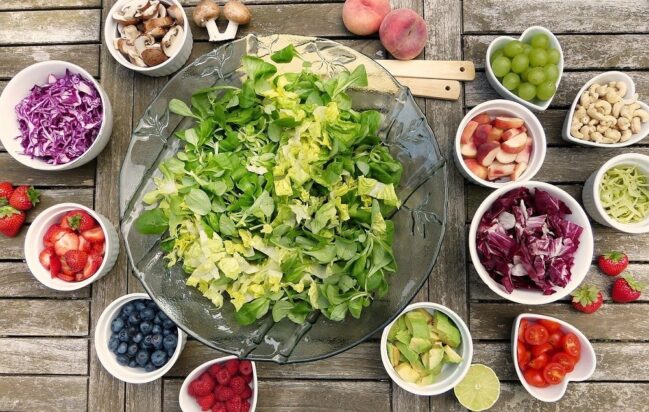Blog
10 foods that can help with depression
April 12, 2021
4 minutes, 25 seconds
This article explores different foods and how they can help with depression.

Depression can have a huge impact on all areas of your life. Affecting your mood, relationships, productivity and general wellbeing, living with depression can often be debilitating.
Depression is a common condition, and anyone can develop symptoms at any stage of their life. It can be treated with medication and various talking therapies, but there are also ways you can manage depression in your daily life. One way is by eating a healthy and balanced diet.
Diet has a significant impact on our mental health and making the right food choices has long been associated with managing symptoms of depression. While we understand that some of these foods could be hard to access, it can be empowering to learn about those which offer antioxidant and anti-inflammatory benefits to help boost your mood.
Foods that help with depression and anxiety
Avocado
Avocado is the ultimate superfood. Containing bucket loads of healthy fats that our brains need, avocados are not only delicious, but they also help by combatting inflammation in the brain and regulating neurotransmitters.
They may be small, but avocados contain 4 grams of protein and are jam-packed with vitamin K, multitudes of vitamin B (B9, B6, and B5), vitamin C, vitamin E12 and omega 3.
Dark leafy greens
Dark leafy greens contain high levels of folate, fibre and other nutrients, which can help to improve and stabilise mood. They are also great sources of alpha-linolenic acid (ALA), which is one of the three main types of omega-3 fatty acids that are vital for brain health.
So, if you can, try to incorporate plenty of leafy greens into your diet. Kale, spinach, sprouts, and watercress are particularly beneficial for mental health.
Berries
Whether you love tucking into berries on their own or adding them to your favourite yoghurt or cereal, you’ll be pleased to hear that they are bursting with goodness.
From strawberries and blackberries through to blueberries and raspberries, berries are full of cell repairing antioxidants, including flavonoid anthocyanin, which is associated with reducing inflammation and lowering the risk of depression.
Depression can cause high levels of inflammation in the body, so the anti-inflammatory effects of berries can help to combat this. They also contain vitamin C, which can help reduce the negative impacts of stress on the body.
Walnuts
Nuts can make a huge difference to your mood, health and wellbeing, and can be consumed alone or added to a wide range of dishes. Walnuts are one of the best additions to your diet if you want to boost your mood and help tackle symptoms of depression.
Walnuts are great for overall brain health and are one of the best plant sources of mood-boosting Omega 3 fatty acids. They also contain high levels of protein, which helps to keep blood sugar levels balanced.
Tomatoes
Containing lots of folic acid and alpha-lipoic acid, evidence suggests that tomatoes help the body convert glucose into energy. This can stabilise the mood by helping to combat lethargy, a commonly cited symptom of depression.
Seeds
Seeds are a fantastic source of Omega 3, with flax, hemp, and chia seeds being scientifically proven to help lift your mood. Pumpkin and squash seeds can also help increase your levels of tryptophan, an essential amino acid that creates serotonin, a key mood-stabilising hormone.
A handful of seeds are a great snack, but again, they can also be added to lots of different dishes.
Oily Fish
Oily fish is a rich source of omega-3 fats. These fats are important for brain health and may impact the functioning of serotonin, a neurotransmitter in the brain that plays an important role in the regulation of our mood.
Multiple studies have also looked at the link between fish consumption and the risk of depression. An analysis of 26 of these studies found that people who consume the most fish were less likely to experience symptoms of depression.
So, make sure your diet features oily fish such as salmon, mackerel, trout, sardines, and tuna.
Onions
Onions are a flavourful and nutritious ingredient to integrate into your everyday diet; you can easily use them to complement meals such as salad, curry, pasta and casserole.
Research indicates that frequent consumption of onion – a natural mood booster – can help consumers manage depression. But that’s not all - the superfood is also associated with a reduced risk of cancers of the digestive tract.
Mushrooms
Mushrooms are great for your mental health as they contain chemical properties which help lower blood sugar levels while boosting your mood. They also promote healthy gut bacteria, which can stabilise your mood by reducing a common symptom of depression and stomach irritability.
Apples
They say an apple a day keeps the doctor away, and there is an element of truth to this. Full of antioxidants, apples also boast lots of soluble fibre, which balances blood sugar and supports a stable mood by promoting regular bowel movements.
If you’re living with depression, remember that help is out there. Paired with the appropriate treatment from your GP, a healthy diet can help you to manage the symptoms of depression.
Alternatively, if you’re interested in becoming a qualified counsellor to be able to help others struggling with their mental health then be sure to check out our counselling courses or see our tips on how to help someone with depression.